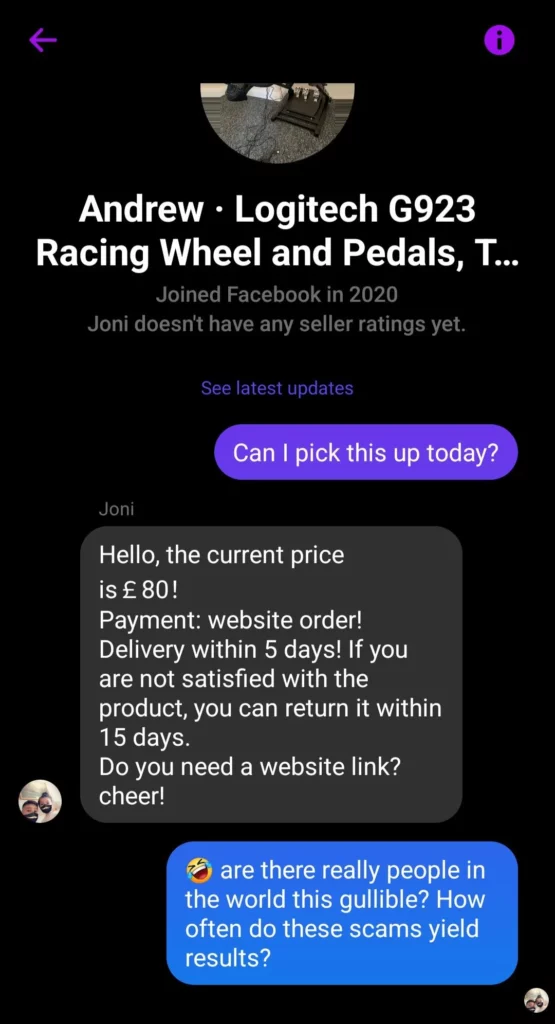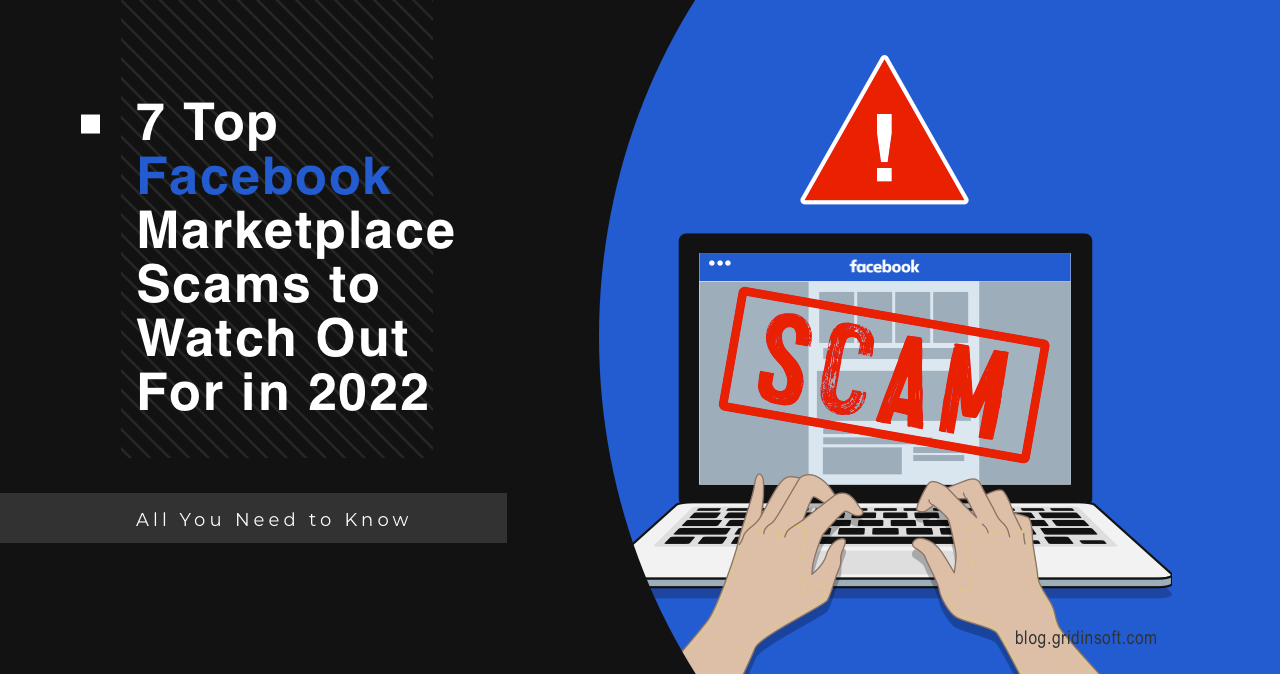Facebook Marketplace allows users to buy and sell just about anything. Just like Craigslist and newspapers, it replaced other ways of advertising for items for sale. Buyers can find a used bike, furniture, car, or vintage clothing from sellers on the Marketplace. And renters don’t have to search every apartment in their neighborhood — they can use Facebook Marketplace to find the parts that fit their needs.
A report from Hootsuite, a social media management platform, states that Facebook Marketplace has over one billion monthly active users worldwide. Additionally, the service reaches 562 million people through ads. One of the reasons this service has risen in popularity is that it doesn’t require any payments to list items for sale or take out newspaper ads. Instead, it connects buyers and sellers for free.
But like any other platform, there are various fraudulent frauds. This article will provide you with a guide to some types of scams on Facebook Marketplace.
Identifying Facebook Marketplace Scams
Facebook recognizes the possibility of fraud on its platform. However, how can you differentiate between a scammer on Facebook Marketplace?
It’s important to be aware of scams that can happen when buying or selling on the Marketplace, according to Facebook’s help section.

He warned people to avoid quick responses and immediate payments. He also recommended waiting at least 12 hours before replying to any offers. Most buyers will ask for additional information about the item for sale. They typically want to see the item in person before paying. Often, sellers may offer the product at too high a price, or they may arrange the offer urgently. Please don’t rush to make these decisions until you’re sure it’s a legitimate company.
Facebook Marketplace Scams
You can get scammed as both seller and buyer on Facebook Marketplace. Buyer fraud occurs when someone tries to buy or trade an item without paying. In seller fraud, someone offers something to sell but doesn’t deliver as promised. Potential Facebook Marketplace scams spotted by Facebook and security experts include these 9 tactics.
1. Send the Item Before Payment Is Received
A buyer can create a fake receipt claiming they’ve paid for merchandise and request the item be sent immediately. Alternatively, a buyer shouldn’t ask the seller to pay in advance.
Because Marketplace sells merchandise via a third party, it would be better to use an accepted payment method when buying items. This includes PayPal and Facebook Marketplace. If paying with PayPal, don’t state that you are paying the seller as a friend or family member. Doing this will invalidate your Paypal protection and might even cause them to lose their funds.

2. A Deal Too Good to Be True
Did you see a listing for the latest popular Nike shoes, for example, at 1/10 of the retail price? The shoes probably are counterfeit, if the goods will be shipped at least.
Ask to see multiple photos of the shoes, a live video, or even an original sales receipt before agreeing to buy. Again, pay with PayPal or another method that protects in case they are counterfeit.
3. Immediate Interest
The “Buyer” wants you to text to arrange for immediate pickup. They will attempt to get your phone number. At this point, scammers can quickly register a Google Voice number, triggering a verification code to be sent to your phone. Scammers will ask you to send a code to confirm you’re real.
What is this scam? I’m selling something on Facebook marketplace, and then this lady wants me to share a Google voice SMS validation. Is she trying to log into *my* Google voice number? pic.twitter.com/ik95KvqyeX
— Scott Hanselman 🌮 (@shanselman) July 29, 2021
In fact, this code unlocks your Google Voice number for crooks, so then they will use it for more frauds. Since these numbers are trusted, other scams’ efficiency will gradually increase.
4. A Fake Rental Property
The advertised home may be exactly what you’re looking for, but don’t make a deposit until you or someone you trust has had a chance to look at the home to make sure it’s just as advertised – and available. Scammers advertise properties that aren’t even rented out, collect money, and disappear.
⚠️SCAM ALERT⚠️ Victim contacted suspect via Facebook regarding apt rental..Victim met up with suspect &
▪️Victim 1 gave $550
▪️Victim 2 gave $1,100
▪️Victim 3 gave $1,050
3 different victims, SAME SCAM! Protect yourself! pic.twitter.com/PXfh7Y1NHW
— NYPD 48th Precinct (@NYPD48Pct) January 29, 2018
5. Bait and Switch
This is a classic bait with a single product advertisement followed by a replacement. For example, you are interested in some product, but the seller says it is no longer available. Then it offers you a more expensive product that is available. Here you need not be afraid to refuse such an offer, as it is most likely a fraudulent scheme.
6. Overpayment
In this case, the buyer and seller agree on the price, for example, 30 dollars. But the scoundrel pays 50 and tells the seller that he accidentally overpaid and asks for $20 back. It’s not a problem until the bank catches up with you. Since the buyer pays 50 instead of 30, then asks the bank to cancel the entire transaction and tells you that he accidentally overpaid. So he gets $20 from you, receives a chargeback, and disappears with both.
7. Giveaways
Offers about getting something cheap in a giveaway are probably a phishing scheme. When you see the list of the latest discounts – it is ok. But when there is no discount but an offer to share your details by the link in the lot description – that should be a red flag. Such lots often lead you to a third-party site, which will ask for your details – the data needed to participate in that “giveaway”. As you can guess, those sites are no good, and you will receive nothing. Meanwhile, crooks will freely manage the data you’ve kindly provided for free.
Ensuring a Secure Facebook Marketplace Experience: A Guide to Reporting Scams
In the age of online transactions, ensuring the security of your transactions on platforms like Facebook Marketplace is crucial. You might find yourself wondering, “How can I trust the Marketplace on Facebook?” Given the prevalence of scams and fraudulent activities, it’s a valid concern.
Fortunately, Facebook has implemented measures to make it easy for users to report suspected fraud and maintain a safe online marketplace. If you’ve fallen victim to a scam, it’s essential to take immediate action. Facebook provides a straightforward process to report scams on the Facebook Marketplace, and doing so promptly can help protect both yourself and others in the community.
Steps to Report a Facebook Marketplace Scam:
- Document the Details: Before reporting a scam, gather all relevant information. Take screenshots of the conversation, listing details, and any other evidence that can support your case. The more detailed your documentation, the better equipped Facebook will be to address the issue.
- Visit the Reporting Page: Access the official reporting page dedicated to Marketplace scams. This page will guide you through the reporting process and provide specific options related to fraudulent activities.
- Select the Relevant Category: Facebook offers various categories for reporting different types of issues. Choose the category that best describes the scam you encountered. This ensures that your report reaches the appropriate department for faster resolution.
- Provide Detailed Information: Fill out the report form with accurate and detailed information. Be specific about the nature of the scam, the user involved, and any supporting evidence you have collected. Clear and concise information expedites the review process.
- Submit the Report: Once you’ve completed the form, review the information to ensure its accuracy. Click the submit button to officially report the scam to Facebook. After submission, Facebook’s team will investigate the matter.
Contributing to a Safer Community:
It’s not just about protecting yourself; it’s also about safeguarding the entire Facebook Marketplace community. If you come across someone attempting to defraud others, consider it your responsibility to report them. By doing so, you contribute to a safer and more trustworthy online environment for both buyers and sellers.
Remember, vigilance and timely reporting are key components of a secure online experience. Stay informed, stay cautious, and actively participate in maintaining the integrity of the Facebook Marketplace.
By following these steps and encouraging others to do the same, we can collectively create a marketplace that thrives on trust and transparency.





